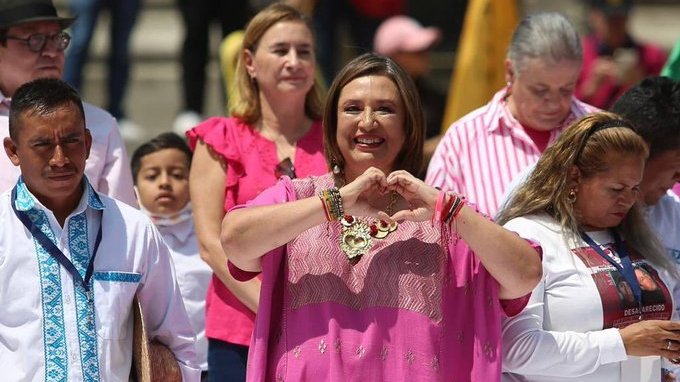On Sunday, September 3, former Senator Xóchitl Gálvez was formally announced as the presidential candidate of Mexico’s right-wing opposition alliance, the Frente Amplio por México (FAM) or the Broad Front for Mexico, for the June 2024 elections. Gálvez will face the candidate of the ruling National Regeneration Movement (MORENA) party who will be announced on September 6.
The FAM is an alliance of the National Action Party (PAN), the Institutional Revolutionary Party (PRI), and the Party of the Democratic Revolution (PRD).
Gálvez, member of the PAN, was chosen to represent the FAM alliance on August 31 after her only rival, Beatriz Paredes of the PRI, withdrew her candidacy.
After formally being declared the candidate, Gálvez addressed the supporters of the three parties. She acknowledged that national opinion polls suggested that the ruling progressive MORENA would win the upcoming elections. However, she claimed that they still had a shot.
On September 3, MORENA concluded its surveys to determine its candidates to lead the Fourth Transformation of the country after President Andrés Manuel López Obrador (AMLO). The results will be announced on September 6.
There are six candidates contesting in the MORENA internal elections: former Mexico City head of government Claudia Sheinbaum; former Foreign Minister Marcelo Ebrard; former Deputy Gerardo Fernández Noroña; former Senator Ricardo Monreal; former Interior Minister Adán Augusto López; and former senator Manuel Velasco. According to some surveys carried out last month, Sheinbaum and Ebrard are the main contenders for the candidacy.
The AMLO administration, throughout the past five years, has enjoyed a high approval rating of over 60%. Many sectors of the country’s working class have supported the AMLO government for its comprehensive economic and social policies, and hundreds of thousands have participated in mass mobilizations in support of the Fourth Transformation of the country led by the MORENA party.
The AMLO administration has managed to bring about a decline in poverty, an increase in minimum daily wage and average annual salary, and a strengthening of the national currency, the Mexican Peso. The government’s social policies such as soft loans, decent pensions for the elderly, support programs for people with disabilities, single mothers, farmers and fishermen, scholarships for students from poor families, and free internet for all, have helped uplift the socio-economic status of the Mexican working class.
On September 1, President AMLO presented the fifth annual report of his government, and promised that he would continue to work for the betterment of the working class in the last 13 months of his government.
“In this fifth report, I can demonstrate that with dignified and hard-working people and with an honest and austere government, it is possible to live in a better, fairer, freer, more fraternal and more egalitarian society,” said AMLO.
“Corruption was the main cause of economic and social inequality. In the social sciences it is taught that inequality occurs because the bourgeoisie, the owners of the means of production, keep the profits, the surplus value, exploiting the workers, the wage-earners. That is the essence of the explanation of why there is accumulation of wealth, but that does not apply at all in our country anymore,” stated AMLO.
“Poverty and inequality were reduced, something that had not happened in Mexico for decades. Both the information released by Inegi (National Institute of Statistics and Geography) and Coneval (National Council for the Evaluation of Social Development Policy) agree that from 2018 to 2022 poverty was reduced by 5.6%, going down from 41.9% to 36.3%. Despite the fall of the economy due to the pandemic and the war, which produced economic and financial instability in the world, especially inflation, our government’s public policy managed to lift 5 million people out of poverty. In addition, in these four years, income inequality between the richest and poorest households has been reduced from 18 to 15 times,” he pointed out.





